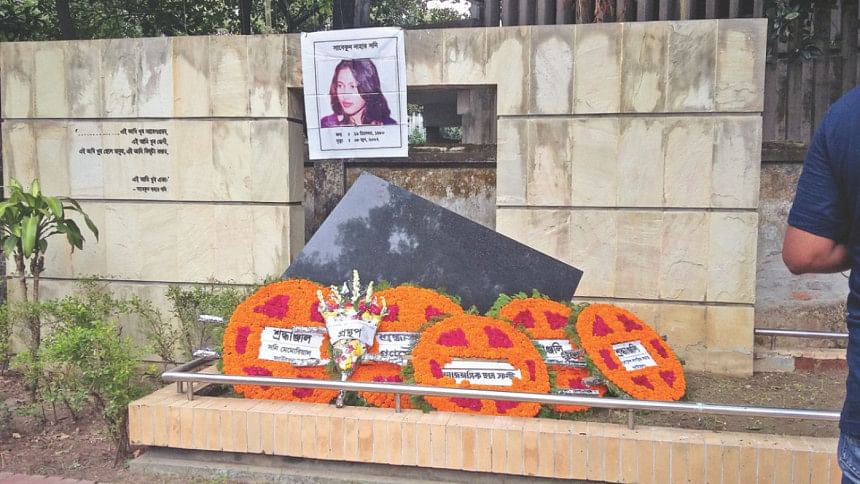SONY: Don't think we are dead

She could have been a scientist, contributing to the complex arena of molecular world, since she was pursuing her graduation in chemical engineering from the country's topmost platform for science and technology - BUET. She could have been a visionary, working for human welfare, since she had been an ardent believer in humanity. But none of these possibilities could be a reality for Sabequn Nahar Sony. All her dreams were shattered at the age of 22, when she was caught in the crossfire between two factions of Jatiyabadi Chhatra Dal (JCD), a pro-BNP student body.
For several reasons, the issue left an indelible mark in the campus history of Bangladesh. She was the first woman to be killed in any campus related violence in the country. Moreover, the verdict delivered by the court is yet to be implemented even after 13 years of the crime. Unfortunately, the untimely, sudden demise of an innocent student did not seem to move the teachers, who were prompt to award punishment – not to the killers but to the students protesting non-violently.
The tragic incident took place on June 8, 2002, the day observed as Santrash Mukto Shikkhangan Dibosh (violence-free campus day) every year since Sony's death, then a second year student of Chemical Engineering. Her friends and acquaintances remember her as a mild-mannered person, whose complete focus was on her education.
The premature death of a struggling student from a middle class family was followed by a series of unusual incidents. Ordinary students of BUET went for an all-out protest, demanding punishment of the killers. A section of students started a hunger strike for an indefinite period as part of their non-violent protest. However, the protesters were attacked by JCD cadres and police personnel, and this led to some of the students losing their consciousness due to the attack as well as their non-stop hunger strike. One would expect BUET teachers' solidarity with the protesters. But the university authorities temporarily suspended Shuvrato Sarkar and Bijoy Sankar Talukder, who led the non-violent movement for about four months.
Despite over a decade having passed since the killing, the incident still hasn't been given the importance it deserves. Our commemoration is limited to some formal programmes on Sony's death anniversary. Even though I am typing on my keyboard with the hope of raising mass awareness against these ruthless killers, most of whom are yet to be arrested, I know this will do very little to shake the conscience of the vested quarters who blatantly have protected the murderers.
Interestingly, the then BUET authority suspended the protesters in different terms, terming them as 'spoilt' boys, who had violated the rules and regulations of the university with their movement. On the other hand, the 'heroes' backed by the then ruling party, who played a great role to shatter Sony and her family's dreams, were allowed to launch a crackdown on the students protesting the murder.
And yet there are a few brave ones who dare to protest injustice. Salute to those 'spoilt' ones. If it were not for them, the British sun would have never set, the Pakistani regime could not be defeated and there would be no country like Bangladesh on the world map.
So, dear Sony, don't think we are dead because the country witnessed the execution of war criminals 44 years into its independence. Similarly, we expect your killers to be punished for their crimes. The trend of using student politics in favour of vested quarters needs to be stopped to achieve that. The malpractices of tender manipulation, toll collection and drug peddling in lieu of raising voices against corruption must be stopped.
I feel a sharp pang in my heart every time I pass the commemorative plaque in which are inscribed the words, "I am lonely, very lonely", taken from an entry in her diary. May she rest in peace – alone in eternal silence. And may the voices that rose in demand for justice reverberate even louder than before.
The writer is a sub-editor of The Daily Star.

 For all latest news, follow The Daily Star's Google News channel.
For all latest news, follow The Daily Star's Google News channel. 



Comments